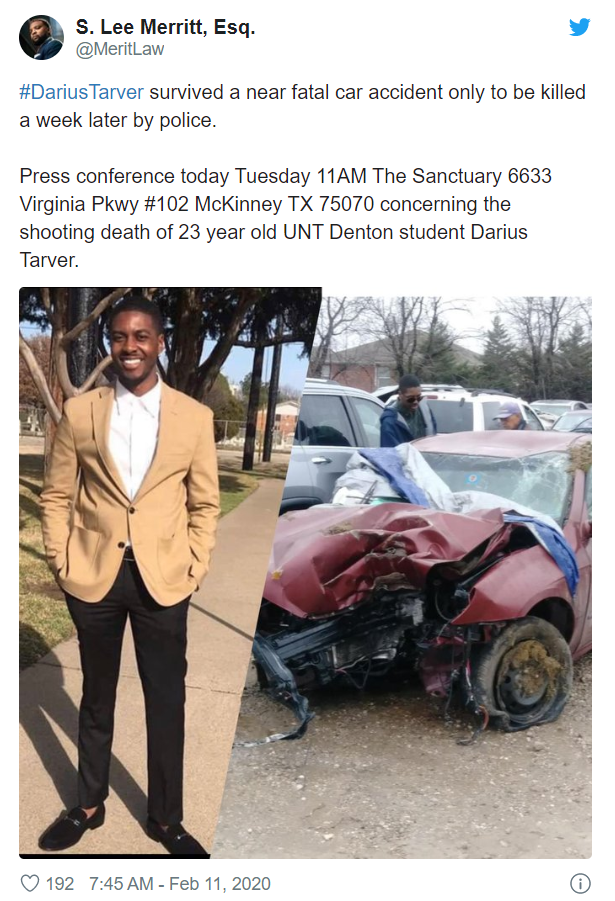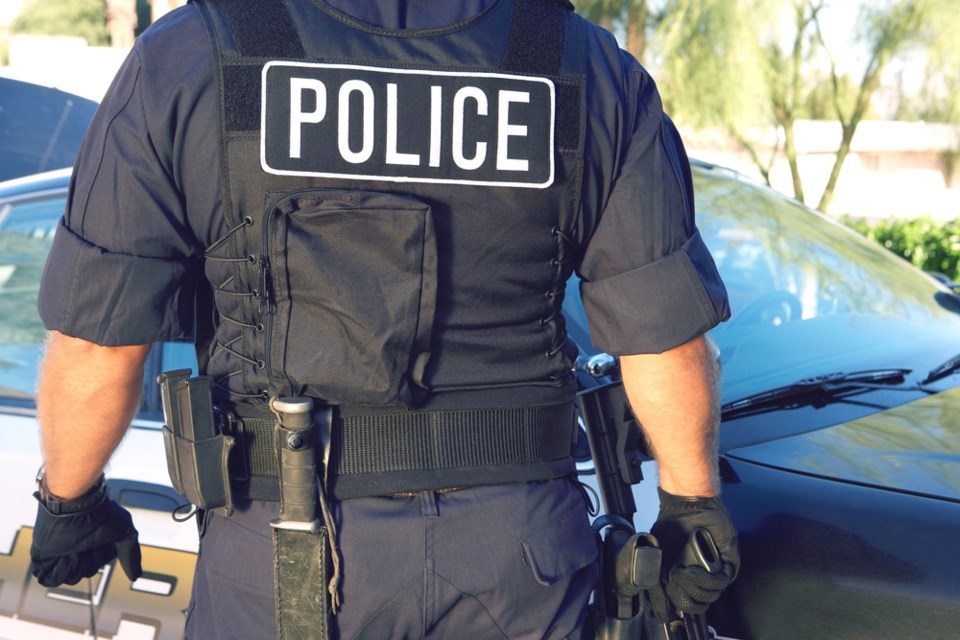The University of North Texas college student charged, wielding a frying pan and a meat cleaver, when an officer shot and killed him at his apartment complex near UNT’s campus, Denton police reported in late January. Darius Tarver was only 23, and studying for a career in law enforcement. He was set to graduate in May.
Now his father, Pastor Kevin Tarver, a chaplain for McKinney police, is disputing Denton police’s version of events that unfolded on that early Tuesday morning.
Last week, Tarver watched the officer’s body cam footage of the incident with a representative from the Texas Department of Public Safety and Denton Police Chief Frank Dixon. At a Jan. 21 press conference, Dixon claimed Tarver’s son had been tased twice before the subject charged officers, stabbing one of them.
Tarver disagrees and points out that his son seemed to be struggling with a mental health crisis. “That’s why it’s so many holes, ‘Meat cleaver-wielding man attacks police?’” he told NBC 5 in Feb. 11 report. “He was the one being attacked. … He fell down and I still see his face crying out, still crying out to God.”
In a prepared statement, Denton police declined to comment “to ensure the integrity of the investigation and the process.” The Texas Rangers is investigating whether any criminal violations occurred. Denton police Internal Affairs is trying to determine if use of force was appropriate. “The death of Darius is tragic for all involved, including our community at large,” Denton police said in the prepared statement. “Our collective hearts go to the Tarver family, as well as friends and students at the University of North Texas.”
But one friend isn’t having it, and uploaded a YouTube video about the police’s and media’s version of the Jan. 21 tragedy.
The details surrounding Darius Tarver’s death have been reported by several news outlets. It seems residents at The Forum at Denton Station apartments had called 911 around 3 a.m. and reported that Tarver was acting erratically, banging on doors and requesting they let him inside. He was also allegedly shattering light fixtures with a frying pan.
Tarver didn’t have a criminal history, and family and friends claim he didn’t use drugs. A week earlier, he’d been involved in a major car accident, and was taken to ICU but was released the next day. Tarver’s family worry he may have been released too soon and could have been suffering from a severe brain injury. “Police were called when Tarver was observed breaking overhead light bulbs with a skillet,” family attorney Lee Merritt said at Feb. 11 press conference in McKinney. “This behavior was consistent with the extreme sensitivity to light and difficulty with impulse control resulting from a severe impact to the brain.”

Denton police reported that officers were on the phone with a 911 caller when they observed Tarver leaving an apartment, holding a frying pan and a meat cleaver. He started walking down the stairs, where officers were located. They told him to drop his weapons, claimed they were there to help him. He ignored their commands and continued advancing. An officer zapped him with a taser. He dropped, shrugged it off and continued advancing.
He got closer. An officer pulled his gun, shot multiple times, hit him once. Tarver dropped, but didn’t get back up.
The officers went to help him, which Denton police claim is when one of them noticed he’d been stabbed during the scuffle. He’s recovering from his stab wound. Tarver was transported to the hospital where he was pronounced dead.
Tarver’s father claims his son didn’t charge officers, or being violent or confrontational. Instead, he was acting like a confused kid struggling with a mental health crisis.
Sadly, it’s not a surprise that police would kill someone experiencing an untreated mental health crisis. People with untreated mental illness are 16 times more likely to be killed by police, the Treatment Advocacy Center found in a Dec. 2015 report “Overlooked in the Undercounted: The Role of Mental Illness in Fatal Law Enforcement Encounters.” And nearly half the people killed by police are disabled, according to a March 2016 report by the Ruderman Family Foundation, a private philanthropic organization dedicated to the inclusion of people with disabilities in society.
Of course, it isn’t just someone in a mental health crisis being killed. Police also find themselves in harm’s way. For example, Jerry Ronald Walker, a detective with Little Elm police, was killed on Jan. 16, 2017, by Rudy Garcia, a 46-year-old Little Elm resident who had a history of schizophrenia and had gone off his medications.
Garcia was also killed by police.
“The media is ignoring the disability component of these stories or, worse, telling them in ways that intensify stigma and ableism,” authors Dr. David Perry and Lawrence Carter-Long pointed out in the March 2016 report. “When we leave disability out of the conversation or only consider it as an individual medical problem, we miss the ways in which disability intersects with other factors that often lead to police violence.”
One major factor involves the lack of adequate mental health training at police departments, which would teach officers how to recognize and de-escalate a situation involving someone in a mental health crisis. The International Association of Chiefs of Police (IACP) Law Enforcement Policy Center offers several tips on how to do so:
- Law enforcement officials should be familiar with signs and symptoms of mental illness or a person in crisis.
- Officers responding to PICs (persons-in-crisis) should attempt to gather as much information as possible on the person through personal observation, as well as information from friends, family, and treating clinicians, where available. This information can then be utilized to assess the individual’s potential danger to themselves, the officers, or others.
- A backup officer should always be requested, as well as assistance from individuals with specialized training in dealing with PICs.
- Whenever possible, officers should take steps to calm the situation. This may include eliminating emergency lights and sirens, assuming a nonthreatening manner, and moving slowly.
It’s unclear what kind of mental health training is available to Denton police. Kristen Jones, Denton police spokesperson, was unable to provide Local Profile the information by press time. She did mention that officers receive mental health training at police academy.
Kevin Tarver claims officers escalated the situation that led to his son’s death instead of de-escalating the situation and protecting his son as they’re sworn to do. He says the version of the events that Dixon shared at a Jan. 21 press conference isn’t the version he saw on the body cam footage, which isn’t available to the public or the media at this point.
“I don’t want people to listen to me, I want people to see the video,” Tarver told reporters. “That’s why we need to get the body cam out.”




